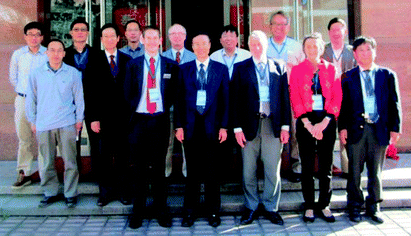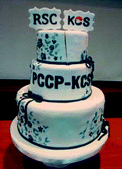PCCP—A Society journal serving the whole community
Happy New Year from the PCCP Editorial team, and welcome to our first issue of 2013. In this Editorial we reflect on some of the events and developments of the past year, and also look forward with anticipation to the months ahead.Publishing the best science
PCCP greatly values its broad, community-spanning scope and readership. As the number of articles submitted to PCCP grows to new record levels, we continue to uphold the highest quality standards for publication. PCCP is well-known for its rigorous, efficient review procedure that is fair to researchers in all countries: our key criteria for acceptance are that articles contain high-quality science, reporting important physical insight of interest to a broad audience. We were pleased to see our focus on quality reflected in the rise of our latest (2011) impact factor to 3.57.As you can see in Table 1, the PCCP articles attracting most attention do indeed truly span our scope, from theory to nanoscience, from cutting-edge energy research to hydrogen bonding. This is a very positive reflection of the multidisciplinary approach of PCCP in publishing articles across physical chemistry and chemical physics within a single volume, maximising the attention they receive. The table also shows a lively mix of both very high quality original research and our popular “Perspective” (review-type) articles.
| Title | Authors | Article type |
|---|---|---|
| Fullerene derivative acceptors for high performance polymer solar cells DOI: 10.1039/c0cp01178a | Youjun He and Yongfang Li | Perspective |
| Characterization of nanostructured hybrid and organic solar cells by impedance spectroscopy DOI: 10.1039/c0cp02249g | Francisco Fabregat-Santiago, Germà Garcia-Belmonte, Iván Mora-Seró and Juan Bisquert | Perspective |
| A thorough benchmark of density functional methods for general main group thermochemistry, kinetics, and noncovalent interactions DOI: 10.1039/c0cp02984j | Lars Goerigk and Stefan Grimme | Paper |
| Titania supported gold nanoparticles as photocatalyst DOI: 10.1039/c0cp00917b | Ana Primo, Avelino Corma and Hermenegildo García | Perspective |
| Enhanced photocatalytic activity of mesoporous TiO2 aggregates by embedding carbon nanotubes as electron-transfer channel DOI: 10.1039/c0cp01139h | Jiaguo Yu, Tingting Ma and Shengwei Liu | Paper |
| Highly efficient CdS/CdSe-sensitized solar cells controlled by the structural properties of compact porous TiO2 photoelectrodes DOI: 10.1039/c0cp02099k | Quanxin Zhang, Xiaozhi Guo, Xiaoming Huang, et al. | Paper |
| Fe3O4 nanoparticle-integrated graphene sheets for high-performance half and full lithium ion cells DOI: 10.1039/c1cp20455f | Liwen Ji, Zhongkui Tan, Tevye R. Kuykendall, et al. | Paper |
| Patchy colloids: state of the art and perspectives DOI: 10.1039/c0cp02296a | Emanuela Bianchi, Ronald Blaak and Christos N. Likos | Perspective |
| In silico screening of metal–organic frameworks in separation applications DOI: 10.1039/c1cp20282k | Rajamani Krishna and Jasper M. van Baten | Perspective |
| The CH/π hydrogen bond in chemistry. Conformation, supramolecules, optical resolution and interactions involving carbohydrates DOI: 10.1039/c1cp20404a | Motohiro Nishio | Perspective |
Our PCCP themed issues highlight some of the most topical areas of our broad scope, and provide a great resource for researchers in these fast-moving fields. It is a great privilege for us to work with world-class Guest Editors on these issues. We welcome your suggestions for future issues—please get in touch with us at pccp@rsc.org if you have ideas for suitable topics.
We would especially like to draw attention to our web collection on biophysics and biophysical chemistry, which shines a spotlight on some of the great work we have recently published in this field, and illustrates the areas that are within our newly-refined biophysical scope.
| 2012 Themed issues | |
|---|---|
| Operando surface spectroscopy | Issue 7 |
| Interfaces of ionic liquids | Issue 15 |
| Ultrafast chemical dynamics | Issue 18 |
| Fragment and localized orbital methods in electronic structure theory | Issue 21 |
| Hydrogen bonding in electronically excited states | Issue 25 |
| Structure and reactivity of small particles: from clusters to aerosols | Issue 26 |
| New insights into organic chemistry from forefront physical measurements | Issue 30 |
| Theoretical chemical physics of biological systems | Issue 36 |
| Electron transfer theory | Issue 40 |
| Biophysics and biophysical chemistry in PCCP | Web collection |
| Organic electronics – new physical insight | Issue 41 |
| Predicting new molecules by quantum chemical methods | Issue 43 |
Serving the whole community
PCCP is proud to be a true Society journal, published by the RSC on a not-for-profit basis, with royalties being returned to our 18 international co-Owner Societies for the benefit of scientific communities around the world.Publishing research from the core physical chemistry subjects right through to the interfaces with materials and biology and beyond, we pride ourselves on the great service we provide to all our authors and readers.
The introduction of our popular Accepted Manuscript service—where the unedited version of a manuscript is published online (in a citable form) as soon as it is accepted—has significantly lowered still further our already-fast times to first publication in PCCP.
We offer flexibility on article layout and formats to make life as simple as possible for authors. Our (optional) PCCP article templates allow authors to quickly prepare their article for submission and are available in Microsoft Word or LaTeX format.
We also know it is important to our authors to make their research as visible as possible, so the latest results can be shared with their colleagues right away. We have invested heavily in our website (www.rsc.org/pccp) and electronic processes to further enhance the speed and “discoverability” of our articles. The way science is funded and the way research is accessed continues to evolve rapidly. As a Society Publisher, RSC Publishing is committed to supporting the scientific communities we serve. We support Open Access models which seek to ensure that scholarly publishing activities operate in a long term, sustainable way. Full information about our policies can be seen at www.rsc.org/Publishing/Journals/OpenScience/
PCCP editors and editorial board
We were delighted to welcome a new Associate Editor to PCCP in 2012: Professor Hedi Mattoussi (Florida State University) who joins our existing Associate Editors Frank Neese (Max Planck Institute for Chemical Energy Conversion, Germany), Katsuhiko Ariga (NIMS, Japan) and Seong Keun Kim (Seoul National University, Korea). We are pleased to offer authors the choice to submit their work to these excellent academic editors or to our team of professional Editors based in Cambridge. We make sure that the same high standards of quality and fairness are applied equally across all submissions.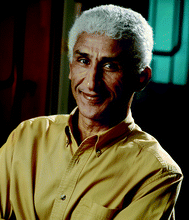 | ||
| Plate1 Hedi Mattoussi | ||
At the end of 2012 we say goodbye to Professor Manfred Martin as he completes his term on the PCCP Editorial Board. We take this opportunity to sincerely thank him for his support and hard work over the years.
Our Editorial and Advisory Board members are renowned experts in their respective fields: PCCP greatly benefits from their support and advice. We know that our readers enjoy finding out what Board members find particularly interesting to read in PCCP in their topic-based “Editor’s Choice” selections of articles. For those of you who may have missed them you can find a selection below:
• Professor Carlos Otero Arean – surfaces and interfaces.
• Professor Seong Keun Kim – biophysical chemistry.
• Professor Charusita Chakravarty – modelling.
• Professor Elangannan Arunan – bonding, kinetics & dynamics.
• Professors Stefan Grimme, Dage Sundholm and So Hirata – theoretical advances.
• Professor Paul Mulvaney – nanoscale chemistry.
With a truly international reach…
With a multitude of great research in physical chemistry and chemical physics being carried out across the globe it is no surprise to see that PCCP is truly international, with science originating from around 60 different countries published in PCCP in 2012. Research published in PCCP is also read and cited by researchers throughout the world, meaning articles in the journal have high visibility.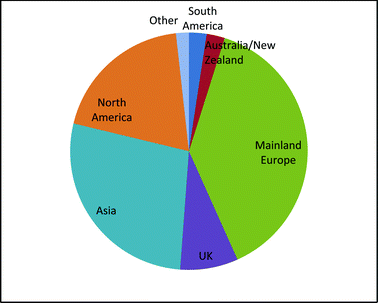 | ||
| Plate2 Geographical origin of published PCCP papers (2012) | ||
Underlining our truly international nature, PCCP was proud to hold a very successful series of world-class physical chemistry symposia in Asia in September and October 2012.
At each of the three venues in China, Japan and Korea, world class international and local speakers gave a varied and exciting programme of talks, which provoked lots of discussion.
We are greatly indebted to our local hosts, PCCP Board members Prof Li-jun Wan (ICCAS), Prof Katsuhiko Ariga (NIMS) and Prof Seong Keun Kim (SNU) for their huge help with the arrangements for the symposia. Look out for a special collection of articles that PCCP will be publishing in 2013 featuring research from the symposia speakers.
The symposium in Seoul also included a special cake cutting ceremony to celebrate the Korean Chemical Society (KCS) becoming PCCP's 18th international Owner Society: we warmly welcome the KCS to the PCCP partnership.
Further underlining our international ethos, the RSC opened an office in São Paulo, Brazil in June 2012 and Dr Elizabeth Magalhaes is the RSC’s representative in the country. She has already been meeting the physical chemistry community at the 22nd ICCT (International Conference on Chemical Thermodynamics) and the 67th Calorimetry Conference (CALCON) meetings which took place in Búzios-RJ, Brazil.
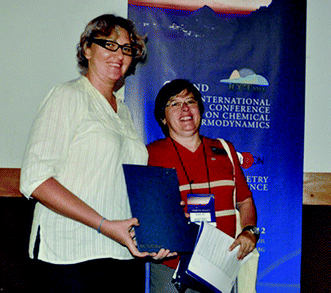 | ||
| Plate3 RSC Brazil representative Dr Elizabeth Magalhaes (right) with prize winner Aneta Pobudkowska-Mirecka (Warsaw University of Technology, Poland) at the ICCT and CALCON meeting in Búzios-RJ. | ||
Moreover, PCCP actively supports the next generation of researchers across physical chemistry and chemical physics. We regularly sponsor conferences and award prizes to outstanding upcoming researchers. In September 2012 we participated in the “Recently Appointed Academics in Physical Chemistry” meeting in Durham, UK which covered themes from research and teaching to getting funding and starting your own spin-out company. Participants were encouraged to present their research and the event provided lots of opportunities to network and develop ideas for future collaborations. We welcome suggestions of future conferences we can be involved with.
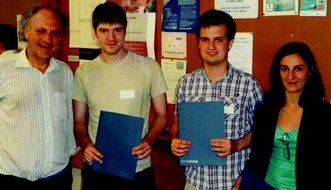 | ||
| Plate4 Prize winners at the National Training School in Theoretical Chemistry 2012: Jonathan Gledhill (Durham) Martina Stella (Bristol) and William Vigor (Imperial College London) with Professor David Logan (University of Oxford). | ||
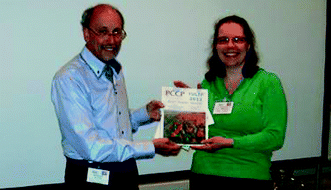 | ||
| Plate5 Christine Hahn won the PCCP Poster prize at the TULIP2012: Modern Developments in Spectroscopy summer school. | ||
Thank You!
We very much appreciate the support of all our authors, referees, readers and Board members. A particular thanks to our referees: your dedicated input is essential to all our success. PCCP is your journal and we look forward to working with you in the coming months and years to ensure that it continues to be the “journal of choice” for the communities we serve.We always welcome your feedback, comments and suggestions; please do contact us at pccp@rsc.org.
With our best wishes for the New Year,
Heather Montgomery
Deputy Editor, PCCP
Philip Earis
Editor, PCCP
Daniella Goldfarb
Chair, PCCP Editorial Board
| This journal is © the Owner Societies 2013 |


